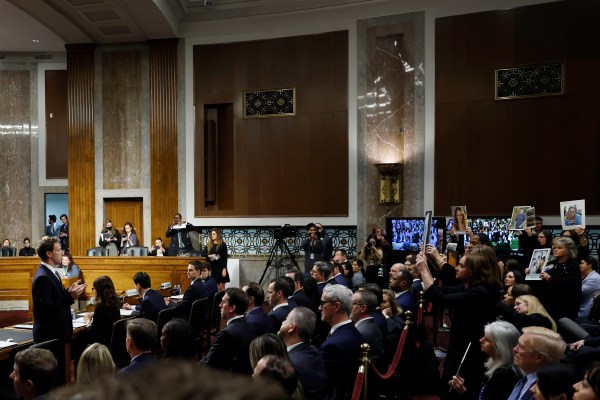Happy Wednesday! And happy Juneteenth! It’s a great day to revisit one of our all-time favorite G-Files, “American Passover.”
Quick Hits: Today’s Top Stories
- Israeli Prime Minister Benjamin Netanyahu claimed on Tuesday that the United States was withholding weapons shipments meant for the country’s ongoing war against Hamas in Gaza. “I said, ‘It’s inconceivable that in the past few months, the administration has been withholding weapons and ammunitions to Israel,” Netanyahu said in a pre-recorded video, describing a recent conversation with U.S. Secretary of State Antony Blinken, who was in Israel earlier this month. “Secretary Blinken assured me that the administration was working day and night to remove these bottlenecks. I certainly hope that’s the case.” The Biden administration paused one shipment of 2,000-pound bombs in May, but it was not clear to which specific shipments Netanyahu was referring. “Everything else is moving as it normally would move and, again, with the perspective of making sure that Israel has what it needs to defend itself against this multiplicity of challenges,” Blinken responded Tuesday. Of Netanyahu, a White House spokesperson told Axios, “We genuinely do not know what he is talking about.” In response to Netanyahu’s public criticism, the White House reportedly canceled meetings scheduled later this week between senior U.S. and Israeli officials on the Iranian threat.
- Meanwhile, the Washington Post reported yesterday that Democratic Rep. Gregory Meeks of New York, the ranking member of the House Foreign Affairs Committee, and Democratic Sen. Ben Cardin of Maryland, the chair of the Senate Foreign Affairs Committee, ended their blocks on an $18 billion sale of munitions and 50 F-15 fighter jets to Israel “several weeks ago.” Weapons sales must have the consent of the four highest-ranking members of the House Foreign Affairs and Senate Foreign Relations committees to proceed, and Cardin and Meeks’ Republican counterparts apparently signed off on the sale many months ago. Meeks had expressed concerns about the civilian death toll in Gaza.
- The upper chamber of Thailand’s National Assembly passed legislation on Tuesday that is poised to make Thailand the third country in Asia to legalize same-sex marriage, following Nepal and Taiwan. The bill—which was approved in the Senate by a 130-4 vote with some abstentions and passed in the lower house in March—will give same-sex couples the same rights as heterosexual couples as it relates to inheritance, adoption, and medical consent. The legislation will now undergo review by a Senate committee and the Constitutional Court before requiring King Maha Vajiralongkorn’s endorsement, which he is expected to give.
- President Joe Biden announced an executive action on Tuesday offering a path to legal status for close to 500,000 undocumented immigrants. The move would allow spouses of American citizens who entered the country illegally and have resided in the United States for 10 or more years to remain in the country while they pursue a green card—a marked departure from the current policy which requires applicants to return to their home country while they apply for permanent residency. The White House also announced changes to allow some U.S. college graduates, including Deferred Action for Childhood Arrivals (DACA) recipients, to get job visas more quickly. This amnesty follows an immigration executive order earlier this month that set limits on asylum claims and faces litigation from the American Civil Liberties Union.
- The Commerce Department reported Tuesday that retail sales grew by 0.1 percent in May and 2.3 percent annually—below the 0.2 percent month-over-month growth that economists had projected. Revised numbers for April’s sales growth now show that sales declined by 0.2 percent last month compared to March. The Federal Reserve is projecting only one interest rate cut this year, but if sluggish consumer spending continues, the central bank could consider multiple cuts, according to a Fed governor.
- The Congressional Budget Office revised its estimate for the 2024 budget deficit from $1.6 trillion to almost $2 trillion—a 27 percent increase on its February estimate—while the total national debt is projected to reach $50 trillion in the next decade. Much of this year’s increase seems to be driven by supplemental defense spending on Ukraine and Israel, President Joe Biden’s student debt “cancelation” initiatives, and increased Medicaid spending.
- In Virginia’s primary election on Tuesday, Republicans nominated Hung Cao—a retired Navy captain who failed to unseat Democratic Rep. Jennifer Wexton in Virginia’s 10th Congressional District in 2022—to face off against Democratic Sen. Tim Kaine in the November Senate contest. Meanwhile, the hotly contested primary for Virginia’s 5th Congressional District—between incumbent Rep. Bob Good, chair of the House Freedom Caucus, and his Trump-endorsed primary challenger John McGuire—was still too close to call at the time of publication Wednesday.
- Legendary San Francisco Giants center fielder Willie Mays died on Tuesday at the age of 93. One of the greatest all-around baseball players in history, the “Say Hey Kid” hit 660 home runs in his career and was one of the first black players in Major League Baseball when he joined the Giants in 1951. He led the team to a World Series win in 1954 as the National League MVP.
Sorting Through A Potential Social Media Warning

Your Morning Dispatchers are of an age to have had the distinct (dis)pleasure of knowing relatively little of the pre-social media world. Still, we tend to think we grew up during the internet’s glory days: The viral “Charlie Bit My Finger” video and the “Nyan Cat” song belong in the Pantheon of the web’s great artifacts.
But today’s internet is not the Nyan cat’s internet.
A growing chorus of voices—including here at The Dispatch—have drawn particular attention to the potential ills of social media for kids and adolescents. These critics point to what they say are the platforms’ intentionally addictive algorithms and to studies that link social media use to depression, anxiety, body image issues, loneliness, and even sexual exploitation and early exposure to pornography. In recent years, members of Congress have regularly called social media company CEOs to testify about what lawmakers describe as their platforms’ failure to protect their youngest users.
U.S. Surgeon General Vivek Murthy—America’s top doctor who is neither a surgeon nor, strictly speaking, a general—chimed in on Monday, calling on Congress to pass legislation adding a surgeon general’s warning to social media apps. The proposal, even if well-intentioned, is fraught with legal and scientific challenges—as are many of the current efforts to restrict social media companies at the state level, whether through legislation or litigation.
In an op-ed for the New York Times on Monday, Murthy labeled the “mental health crisis among young people” an “emergency.” Social media, he wrote, was an important “contributor” to that crisis, citing a study of almost 7,000 American adolescents who reported increased mental health problems associated with spending more than 3 hours a day on social media.
Murthy called on Congress—which has shown a bipartisan willingness to regulate social media platforms in the name of protecting children—to pass legislation requiring a surgeon general’s warning for social media products, like the ones found on a pack of cigarettes or alcohol products. Following some prolonged First Amendment litigation, the Food and Drug Administration just enacted a new rule with some dozen new warnings for tobacco product packages, now including full-color images of tumors, missing toes, and blackened lungs. The graphic warnings have proven more effective at convincing people not to smoke than the small, text-based caution the U.S. put on tobacco products for many years.
Unlike decades of research that drew a clear, causal link between, for example, smoking cigarettes and developing lung cancer, the science on social media’s effects on kids’ mental health is far from settled. Even Murthy acknowledged as much in the very first paragraph of his op-ed. “One of the most important lessons I learned in medical school was that in an emergency, you don’t have the luxury to wait for perfect information,” he wrote. “You assess the available facts, you use your best judgment, and you act quickly.”
There’s vigorous debate about the extent to which social media is causally responsible for young people’s seemingly declining mental health. It could be that young people are no more depressed or anxious than they’ve always been, but “we’re talking about it more,” Dr. Michael Rich—director and founder of Boston Children’s Hospital’s Digital Wellness Lab and Clinic for Interactive Media and Internet Disorders—told TMD. “ You know, 30 years ago, it wasn’t spoken about so much.”
On the other hand, psychologists and public intellectuals like Jean Twenge and Jonathan Haidt present compelling evidence of a strong correlation between social media use and poor mental health outcomes, arguing that those outcomes bottomed out in the early 2010s just as kids were moving their lives online en masse for the first time. If warnings limited social media use, perhaps it could improve youth mental health on the margins.
Regardless of the scientific evidence of direct causality, which researchers will surely continue to investigate, the presence of the debate itself could indicate labeling social media like a cancer-causing narcotic may be premature at best, and counterproductive at worst. “Tobacco is a product that is toxic when used as directed,” Rich said. “Social media is not that, and so we are seeking a binary answer to a complex and nuanced question, and that doesn’t serve to protect very well.”
But causality is important as a legal matter, if indeed Congress pursues a warning. “The courts have held … that if the information in question is purely factual and non-controversial, then a regulation is likely to be okay under the First Amendment, as long as it’s reasonably related to the government’s interest in question,” Clay Calvert, a First Amendment scholar and fellow at the American Enterprise Institute, told TMD. “The problem here is that the information in question is not purely factual.”
Actually implementing a warning is complicated for other reasons: What counts as a social media company, anyway? What would the warning actually say? How would it be displayed? Each one of those questions could open up the possibility for litigation. “The government would be compelling [social media companies] to express messages that obviously they disagree with, so that raises First Amendment concerns,” Calvert said.
It’s not clear what Congress will do. The cosponsors of the bipartisan Kids Online Safety Act (KOSA)—GOP Sen. Marsha Blackburn of Tennessee and Democratic Sen. Richard Blumenthal of Connecticut—seemed more interested this week in using the surgeon general’s appeal as a springboard to get a vote on their bill than moving on warning legislation. KOSA, which has nearly 70 cosponsors and is likely to easily pass the Senate, would require social media companies to provide adaptations to certain potentially harmful features, making it possible to turn off the “infinite scroll” system or the algorithmic recommendations, among other provisions enforceable on penalty of civil litigation.
Senate Majority Leader Chuck Schumer has not yet set a vote on the bill, though it’s possible Murthy’s appeal was a red herring meant to up the pressure on Congress to pass the meatier regulations. “To be clear, a warning label would not, on its own, make social media safe for young people,” Murthy said, encouraging changes he advocated last spring in an advisory. “Such measures, which already have strong bipartisan support, remain the priority.”
Statehouses have been at the bleeding edge of social media regulation in recent years, with dozens of states passing different flavors of restrictions aimed at protecting minors on social media apps. Several states, including New Jersey, Illinois, Tennessee, and Utah, have adopted—or are on their way toward adopting—legislation that creates a minimum age requirement for social media use and will necessitate some sort of age verification regime.
In Florida, for example, Republican Gov. Ron DeSantis signed into law this spring a measure—set to go into effect on January 1, 2025—that blocks kids under the age of 14 from opening an account on a social media platform and requires that 14- and 15-year-olds have parental consent before they do so. As Nick Hafen wrote in an explainer on the site earlier this year, the Florida law defines social media companies as platforms:
… where at least 10 percent of users under age 16 average two or more hours a day on the platform and that allow users to upload content or view other users’ content; analyze user data to select content for users; and have at least one “addictive feature,” such as infinite scrolling, push notifications, metrics (such as likes and reposts), auto-play videos, or livestreaming. It covers companies doing business in Florida.
In part because it hasn’t yet gone into effect, the Florida law hasn’t yet been hit with any lawsuits. But it certainly raises legal questions about First Amendment compliance and ethical questions about privacy. “There’s a First Amendment right to be anonymous—of anonymous speech, and now in order to access speech, you can no longer be anonymous,” Calvert told TMD. “You have to convey information, and that information is going to include a lot of private information that, if it fell into somebody else’s hands, could be used for things like identity theft.”
Even with all of this seemingly bipartisan movement to regulate social media companies, it’s not clear that government intervention will be effective in reversing whatever ill effects social media is causing or keeping kids safe online. And maybe social media could be a little like tobacco, after all.
“Ultimately, parents know what their kids are capable of better than anybody,” said Rich, the Boston Children’s Hospital clinician. “And this is not to put it all in the parents’ lap—I think we absolutely have to be working with the tech companies to help create algorithms and platforms that work toward a second bottom line of digital wellness for us all because if they don’t, they will lose their consumers, just the way tobacco companies lost consumers.”
Worth Your Time
- What’s life like for the U.S. ambassador to China, Nicholas Burns? “Burns compares his role in China to being America’s ambassador to Moscow at the height of the Cold War in the 1950s and 1960s,” Edward Luce wrote for the Financial Times. “As a life-long career diplomat—who was a scholar at Harvard’s Kennedy School before Joe Biden tapped him for the ambassadorship—Burns is careful with his phrasing. His Chinese counterparts are unfailingly courteous, he says. Yet there is no disguising the day-to-day tension and high stakes involved in the relationship. … ‘John F. Kennedy talked about the ‘long twilight struggle,’ says Burns. ‘This might be [the] 21st-century version of that where we have to compete yet stay engaged so we can drive down probability of a conflict.’ At the same time, however, ‘we are locked into a battle of ideas with Beijing—our democratic values versus their authoritarian mindset. We are waging that here daily in seeking to defend our view of the future.’”
- Russian forces are cracking down on Evangelical churches in Russian-occupied Ukraine, Matthew Luxmoore reported for the Wall Street Journal. “Moments after the band struck up a song of praise at a Christian church in a Russian-held city near [Zaporizhzhia, Ukraine], Russian soldiers stormed in wearing full tactical gear,” Luxmoore wrote. “One of them wove through the crowd, mounted the stage, and told the congregation to prepare their documents for inspection. The service in September 2022 was the last held inside Melitopol’s Church of God’s Grace. The Russian authorities took over the building, adorned it with murals depicting their dead fighters, and converted it into a culture ministry in this part of occupied south Ukraine. The church’s erasure from view is part of a sweeping crackdown inside Russian-held territory on religious groups that aren’t under Moscow’s control, especially the evangelical Christian faiths the Kremlin considers instruments of U.S. influence in Ukraine. Mykhailo Brytsyn, the church’s Baptist pastor, said he was questioned by Russian soldiers for four hours and told: ‘You don’t run a church. You run a nest of American spies.’”
Presented Without Comment
Politico: Make Europe Great Again: Hungary Channels Trump In EU Presidency Slogan
Also Presented Without Comment
Associated Press: Noam Chomsky’s Wife Says Reports of Famed Linguist’s Death Are False
Also Also Presented Without Comment
ABC News: ‘Mysterious’ Monolith Similar to Column Seen in 2020 Appears in Las Vegas Desert: Police
In the Zeitgeist
Baseball icon Willie Mays, who passed away Tuesday, will be remembered as one of the greatest players of all time. Key to his legend status is Game 1 of the 1954 World Series—which his Giants eventually won*—when he executed perhaps the greatest catch in baseball history. So great, in fact, that it’s known simply as, “The Catch.”
Toeing the Company Line
- What kind of wine did Thomas Jefferson prefer? What about the presidents who didn’t drink? What kind of (Spanish) wine would Steve recommend to a head of state? Steve was joined by Fred Ryan, chief of staff to former President Ronald Reagan and author of Wine and the White House: A History, to discuss all that and more on Dispatch Live (🔒). Members who missed the conversation can catch a rerun—either video or audio-only—by clicking here.
- In the newsletters: Nick wondered (🔒) whether “cheapfakes” are just “fake news” by any other name.
- On the podcasts: Jonah is joined on The Remnant by Francis Dearnley, the host of The Telegraph’s “Ukraine: The Latest” podcast, to discuss the world of British politics, the anti-Israel protests in the U.K., and the future of the war in Ukraine.
- On the site today: Charles Miller analyzes the Supreme Court’s recent ruling in the “Trump Too Small” case and what it means for political speech and Kevin proposes a radical fix for many of America’s economic woes: unilateral free trade. Plus, Jonah argues the Supreme Court isn’t nearly as polarized as it’s portrayed to be and Joseph Roche reports from Kharkiv on the Ukrainian soldiers fending off Russia’s advances in the region. “We know why we’re fighting,” a Ukrainian commander told Roche. “In contrast, when we capture Russians, we see that they are neither prepared nor motivated. To me, they don’t stand a chance against us.”
Let Us Know
Is there a youth mental health crisis? If so, do you think social media use is causing it or correlated with it?
Correction, June 20, 2024: Willie Mays was a member of the New York Giants when he won the 1954 World Series, not San Francisco Giants. The Giants moved to San Francisco in 1958.











Please note that we at The Dispatch hold ourselves, our work, and our commenters to a higher standard than other places on the internet. We welcome comments that foster genuine debate or discussion—including comments critical of us or our work—but responses that include ad hominem attacks on fellow Dispatch members or are intended to stoke fear and anger may be moderated.
With your membership, you only have the ability to comment on The Morning Dispatch articles. Consider upgrading to join the conversation everywhere.